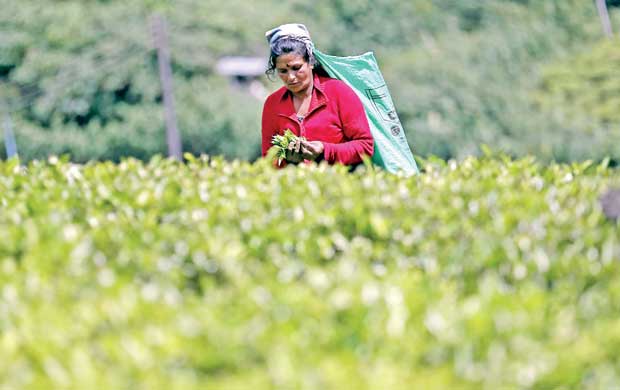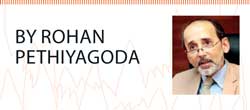01 Nov 2017 - {{hitsCtrl.values.hits}}

 I was astonished to read claims attributed to Rohan Fernando and Jayantha Karunaratne, the past and present Chairmen, respectively, of the Tea Exporters’ Association (TEA), in ‘Mirror Business’ of October 23.
I was astonished to read claims attributed to Rohan Fernando and Jayantha Karunaratne, the past and present Chairmen, respectively, of the Tea Exporters’ Association (TEA), in ‘Mirror Business’ of October 23.
These gentlemen claim that “Ceylon tea brands haven’t been able to compete with the diverse range of global tea brands and blends due to the lack of tea promotional activities by the government despite the collection of a Tea Promotional Levy” and “Rs.2 billion was already spent in an ad hoc manner on activities, such as local tea cafes, pageants, ‘Katina’ religious events, cricket matches and other failed projects, without doing a proper assessment on the benefit such spending would do to the Ceylon Tea brand.”
This, if nothing else, is something of an own goal. I will not dwell on the Rs.1 million spent on religious events they refer to because, unlike these gentlemen, I do not profess a religion and so have no axe to grind there. However, the ca Rs.600 million spent on sponsoring Sri Lanka Cricket (SLC) and the ca Rs.100 million spent on the “tea café” known as Ceylon Tea Moments were arguably the result of poor judgement on the part of the Tea Board. But those investments were made during the tenure of the last government, in 2013. I, as an appointee of the present government, have chosen to look forward rather than dwelling on the putative mistakes of the past. As such, I have accepted the collective responsibility of the Tea Board and chosen never to criticize the former government, in which, however, I played no part.
But it seems Rohan Fernando has belatedly chosen to set himself up as a critic of the previous administration, of which he was very much a part. How quickly loyalties fade! Indeed, he was a Director of the Tea Board at the very time these “ad hoc” expenses were incurred. I have checked the minutes of board meetings of the time and can find no record of any objection or reservation being voiced by Fernando on these matters.
He did not even call for a vote at the board, which is the minimal expression of dissent. The waste he refers to is therefore as much his responsibility as anyone else’s. He was very much part of the problem for which he now presents himself self-righteously as the saviour. He claims the present government lacks a backbone. It was the present government which, however, had the backbone to bring the SLC sponsorship to an end and also to close down the “tea café” he refers to. The present administration found the backbone to do the right thing. Where was Fernando’s backbone when he was party to the decision to “waste” these hundreds of millions of rupees?
How ironic that the people who were variously in bed with the previous government or hiding under their beds like mice, afraid to raise their voices in case the white van called at their door, have now begun to roar like lions about other people lacking backbones. I admire their new-found courage.
Where are these “researches”?
The TEA also claims that “multiple researches have shown that liberalizing the tea industry by allowing the importation of foreign teas for blending and re-export will increase both the per-kilogramme price and the volume of tea exports from Sri Lanka but protectionists aren’t willing to accept
such evidence.”
Where are these “researches”? Karunaratne is at this very moment a Director of the Tea Board. He meets me often. I take or return all his calls (as a matter of fact, I take or return everyone’s calls). Yet, he has never shown me any of these “researches”. Why? What is there to hide? Has either Fernando or Karunaratne ever presented a board paper to the Tea Board seeking the reforms they espouse? No. Never. Instead they choose to lobby their cause via the newspapers with vapid claims of “evidence” and “researches”.
The same applies to the demand made by the TEA to the media that the Rs.5 billion in the Tea Promotion Fund be handed over “to the exporters to set up a campaign on their own”. Has the TEA made such a proposal to the Tea Board? No. Has it made such a request to the minister? No. All this, it seems, just so the leadership can impress its membership of their power and influence. Talk big to the press and then cower under the table at meetings where such proposals can be made and discussed freely among peers.
You state that “Fernando noted that many people are comparing tea to apparel and are questioning why apparel exports are much higher than the tea industry.” This is such a trite and childish comparison that it does not deserve the dignity of a response. There is no doubt that the apparel industry transformed Sri Lanka’s economy and, thanks to the empowerment of women, also our society. All kudos to it. However, when adjusted for raw-material imports of fabric, yarn and accessories, its contribution to exports does not outstrip tea by a commensurate margin. Besides, the apparel industry employs substantially fewer than half as many people as the tea industry. To compare the two industries in such simplistic terms is, therefore, meaningless if only for the reason that we have a duty to consider also the well-being not just of the Benz-driving well-connected highflyers in Colombo but also the livelihoods of the 400,000 rural tea smallholders upon whom the prosperity of these fat cats depend.
The TEA also belatedly exhorts the government to “Stop everything (cesses)”. Well, that is something the government has already chosen to do for reasons that have nothing to do with the TEA. It is sad that the TEA seems to want to make it look like the government is about to cave into their “demands”. In fact, even the offer to cease the tea promotion levy of Rs.3.50/kg came not from the TEA but from Plantation Industries Minister Navin Dissanayake, while the decision to suspend the cess (with which, by the way, I do not agree) came from the Treasury as part of the International Monetary Fund (IMF) review. The leadership of the TEA now seems to want to “demand” these and claim them as their very own victories. How pathetic!
We need to remember that the TEA is not the tea industry but just one of its five stakeholder groups. The other four are the smallholders, producers, traders and brokers (presumably the people referred to by the TEA as “inefficient protectionist elements”). Of the five, the TEA is very much the Johnny-come-lately.
The government must heed not just the interests of the exporters but those of the entire industry. Even among the exporters, several of the best and brightest have refrained from taking membership of the TEA. Sadly, the TEA seems never to have been able to see the welfare of the industry in holistic terms and instead furthers only its narrow, parochial
self-interest.
It is tragic that the TEA, rather than engaging in the development of national policy through the official channels open to it, including the fact that its chairman serves ex-officio as a director of the Tea Board, chooses instead to throw stones from the sidelines.
Maybe the government does need to grow a backbone. First, however, the TEA needs to grow a brain.
(Rohan Pethiyagoda is Chairman of Sri Lanka Tea Board)
04 Jan 2025 4 hours ago
04 Jan 2025 4 hours ago
04 Jan 2025 5 hours ago
04 Jan 2025 5 hours ago
04 Jan 2025 6 hours ago